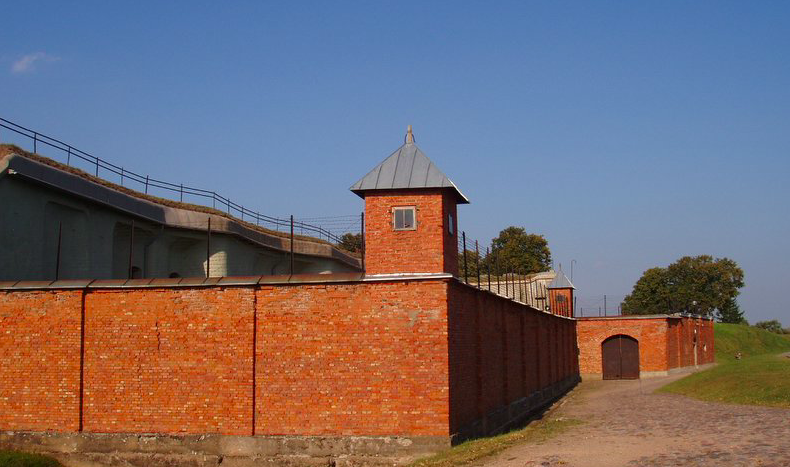Lithuanian High Schoolers Creating E-Book to Document History of Destroyed Jewish Community
 by Rachel Frommer
by Rachel Frommer

Kaunas Ninth Fort, a former execution camp, where some young people have taken “Holocaust selfies.” Photo: Wikimedia Commons.
An initiative has been launched to teach Lithuanian high school students the history of the country’s complicity in the Holocaust, with a goal of reaching a total of two dozen schools by the end of 2017, the Jewish Press reported on Monday.
The project, called “A Young Persons’ Guide to Lithuania’s Vanished Litvak Communities,” will culminate in the creation of an e-book “about Lithuania’s sadly forgotten Litvak history, heritage and culture,” according to the project’s Facebook page. Each school involved in the program will write a chapter.
The program, which has included educational seminars about Lithuania’s activities during World War II and student trips to former Jewish towns and ghettos, was started by the International Centre for Litvak Photography (IC4LP), an NGO founded by Britain-born Lithuanian transplant Richard Schofield.
Schofield, a non-Jewish documentarian and photojournalist, told the Jewish Press he became interested in telling the story of the country’s destroyed Jewish communities after he noticed that Lithuanians did not discuss and were not even familiar with that element of their country’s history. He said that he became “haunted by these ghosts [of the Holocaust] and [I] refuse to rest until their memory is properly respected” — which meant forcing Lithuanians to take an honest look at their own history.
According to Schofield, high schoolers were walking away from their history classes with disturbing misinformation, like thinking Jews were murdered because they were communists, as one student said they had been taught.
Schofield has put much of the blame for this culture of non-education on the state. Only last year, the Lithuanian government promised to publish the names of 1,000 Nazi collaborators, including some hailed as national heroes — information officials had covered up for decades.
“The Holocaust in Lithuania is a Lithuanian issue, not a strictly Jewish one,” Schofield said. “More and more people are realizing this, and realizing, too that it’s okay for your country to have some pretty dark moments in history.”
“I’m not on a big mission,” Schofield told the Jewish Press. “In fact, I’ve always tried to avoid the Holocaust. But no one teaches the children that about 120,000 people were murdered.”
Though Schofield is neither a trained educated nor an historian, he has connected with world-renowned Holocaust scholars through his work at the IC4LP.
One of the topics Schofield has tackled in the high school program has been the rise of the “Holocaust selfie,” or the practice seen primarily among millennials of taking pictures at Holocaust memorials, Nazi killing fields and concentration camps.
“We’re not here to shame these young people,” Schofield said. “We know they’re mostly good kids like most kids are.”
IC4LP has already visited seven schools, amounting to hundreds of students. It plans to hit its goal of 50 institutions and publication of the e-book by February 2018, as part of Lithuania’s upcoming centenary celebration of its independence.
 Police Stop Anti-Zionist Agitators From Accessing Florida University President’s Home as Students Revolt Nationwide
Police Stop Anti-Zionist Agitators From Accessing Florida University President’s Home as Students Revolt Nationwide Nearly One in Five Young People Sympathize With Hamas, 29% Say US Should Reduce or End Alliance With Israel: Poll
Nearly One in Five Young People Sympathize With Hamas, 29% Say US Should Reduce or End Alliance With Israel: Poll Ilhan Omar Silent After Daughter’s Arrest, Suspension for Role in Columbia University Anti-Israel Protest
Ilhan Omar Silent After Daughter’s Arrest, Suspension for Role in Columbia University Anti-Israel Protest Cultural Center Backed by Iran’s Revolutionary Guard Plans to Produce Films About Attack on Israel
Cultural Center Backed by Iran’s Revolutionary Guard Plans to Produce Films About Attack on Israel How Does Ilhan Omar Really Feel About Iran?
How Does Ilhan Omar Really Feel About Iran? This Passover, Combine Respect for Tradition with the Courage to Innovate
This Passover, Combine Respect for Tradition with the Courage to Innovate Israel’s Iran Attack Carefully Calibrated After Internal Splits, US Pressure
Israel’s Iran Attack Carefully Calibrated After Internal Splits, US Pressure Palestinian Cameramen Exposed in New Footage Documenting Oct. 7 Atrocities Side by Side with Terrorists
Palestinian Cameramen Exposed in New Footage Documenting Oct. 7 Atrocities Side by Side with Terrorists US Money to Convicted Terrorists; US Training to Aspiring Terrorists
US Money to Convicted Terrorists; US Training to Aspiring Terrorists Man Arrested in Paris After Iran Consulate Incident
Man Arrested in Paris After Iran Consulate Incident



 Cultural Center Backed by Iran’s Revolutionary Guard Plans to Produce Films About Attack on Israel
Cultural Center Backed by Iran’s Revolutionary Guard Plans to Produce Films About Attack on Israel Ilhan Omar Silent After Daughter’s Arrest, Suspension for Role in Columbia University Anti-Israel Protest
Ilhan Omar Silent After Daughter’s Arrest, Suspension for Role in Columbia University Anti-Israel Protest Tehran Signals No Retaliation Against Israel After Drones Attack Iran
Tehran Signals No Retaliation Against Israel After Drones Attack Iran Nearly One in Five Young People Sympathize With Hamas, 29% Say US Should Reduce or End Alliance With Israel: Poll
Nearly One in Five Young People Sympathize With Hamas, 29% Say US Should Reduce or End Alliance With Israel: Poll Israeli Government Approves Increased Payments to Returned Gaza Hostages
Israeli Government Approves Increased Payments to Returned Gaza Hostages